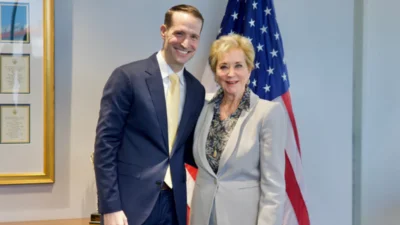Members of the Iowa Central Community College Chapter of the Phi Theta Kappa Collegiate Honor Society, along with Iowa Central President Dr. Jesse Ulrich and Chapter Advisor Samantha McClain recently attended the 2023 All-Iowa Academic Team Banquet in Des Moines.
The four Members of the Iowa Central PTK Chapter named to the All-Iowa Team include Abbie Burger, Jade Durfey, Orwa Hamed and Koto Imahori.
Phi Theta Kappa is the premier honor society recognizing the academic achievement of students at associate degree-granting colleges helping them to grow as scholars and leaders. The Society is made up of more than 3.8 million members and in 11 countries, with approximately 240,000 active members in the nation’s colleges.
At the conclusion of the All-State Banquet, Imahori was named the New Century Pathway Scholar for the State of Iowa. To be named a Pathway Scholar, the recipient must receive the highest overall score of all students in Iowa who applied for the scholarship. New Century Transfer Scholars are selected based on their academic accomplishments, leadership, activities and how they extend their intellectual talents beyond the classroom. Over 2,400 students were nominated from more than 1,300 colleges across the United States. Only one New Century Scholar is selected from each state.
A sophomore from Aichi Ken, Japan who came to Iowa Central as an international student via Wisconsin Lutheran High School, Imahori is majoring in exercise science. She is chapter president of PTK at Iowa Central. She is a member of the Triton Track and Field Team and has received Academic All-Region and All-American honors for her accomplishments on the track and in the classroom as well as being a President’s and Dean’s List honoree. She is the first New Century Scholar from Iowa Central. Koto will receive a $2,200 scholarship and will be recognized at the American Association of Community Colleges Convention in Denver in April. She plans to transfer to the University of Florida after graduation.
In her New Century application, Imahori shared the challenges of being an international student and the difference in athletic expectations between the United States and Japan that have driven her to succeed.
“Success is a reflection of your personal growth,” she said. “That growth as a person motivates me to succeed even more. Transferring to high school in Wisconsin from a Japanese high school as a junior was the biggest turning point in my life. My ‘normal’ was not normal elsewhere. Your comfort foods, religious beliefs, manners- everything was different from Japan. My high school experiences still have been helping me to be a better person every day because now, I am in college and meeting even more diverse people. I can say with confidence that I am succeeding in studying abroad because I can feel that I am becoming more accepting, more motivated, and more compassionate every single day.”
Imahori said that as an exercise science major, she hopes she can take what she has learned about coaching and athletics in the United States and overcoming the adversities of an eating disorder to change the future of sports in Japan.
“I would like to change some toxic aspects of Japan’s sports culture by learning about effective coaching methods in college in the U.S.,” she said. “I practiced seven hours every single day (in Japan); spending more time with my coaches and teammates than with my family. My Japanese coaches always hit me when I lost the races at the track meets. I cannot count how many times I was hit in the first decade. I gradually put my self-worth in performing on the track because my coaches changed their attitudes towards me by my performance. Physical violence as a coaching technique has a long tradition in Japan, and violence and abuse are too often part of the young athletes’ experiences. I did not realize how unsafe it was when I was in Japan. However, I have realized a lot of different practices by joining the track team in high school and college in the United States. I have met a lot of coaches who advised me with positive words. My good relationship with coaches in the U.S. made me understand that my self-worth is not determined by numbers such as my times in track. I truly believe that my experiences and the knowledge I will acquire in college will change Japan’s sports cultures and futures for young athletes in Japan.”
Original source can be found here.


 Alerts Sign-up
Alerts Sign-up